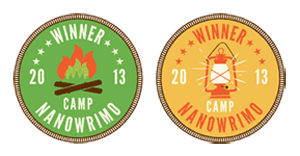Speculative Fiction: Culture Lab
by Betsy James
Speculative fiction (science fiction, fantasy, horror, magic realism, and slipstream) gives voice to those who explore societal and technological change along with deeper considerations of underlying archetypes of human experience.
~ from the Clarion West site
 Speculative fiction? What’s wrong with the terms science fiction and fantasy? (And get off my lawn!)
Speculative fiction? What’s wrong with the terms science fiction and fantasy? (And get off my lawn!)
Nothing’s wrong.
But as human imagination pokes into new corners, makes mashups of old categories and roams around the zeitgeist in ways that would have alarmed our literary forbears, fiction has ranged so widely that an umbrella term has emerged for this adventuring.
Speculative fiction: it’s not just magic and little green men.
What is it, then?
For one thing, it’s a helluva lot of fun. To mess around with magic (i.e., make human yearning visible), design cultures and tinker up universes—what’s not to like? Some dismiss it as pretty low-class fun: beach reading, wish-fulfillment, green slime and improbable sex (again, what’s not to like?). But in variety, depth and class this immense genre has evolved dramatically since the days of Conan and tin rocket ships. Speculative fiction is what happens when you put no limits on the question, What if?
And answers to that “What if?” can be profound. Even in its snotty adolescence, speculative fiction was a thinking tool, a literature of ideas. It’s sometimes not appreciated how expansive, and how deep, that thinking can be.
What we call “science” fiction has always functioned as a creative playground for technology. What’s less realized is spec fic’s potential for exploration in the humanities. When applied to human culture and feeling, fictional play is an experiment in understanding—one that works, not by data, but by image and story.
Why do we need this passionate play? Especially now?
We are thrown together in a shrinking and interconnected world. We need ways to think about ourselves and our neighbors, because—consciously or otherwise—we project our stereotypes on one another.
It’s embarrassing. Plenty of my own North European relatives (who have been here four hundred years, long enough to get a clue) still subconsciously believe that those of you who are Native American spend most of your time wearing feathers and thinking deeply spiritual thoughts. And that you who are Hispanic are sub-literate and tend to be found asleep under a species of cactus that doesn’t even grow in New Mexico.
This cuts both ways, of course. I teach at Zuni Pueblo, where a small girl once said to me, “When I was little, we used to play White People.” I said, “Um…how do you play that?” She said, “Oh, you know. You get two chairs, you put a sheet over them and sit in there. Then your friend comes and says, ‘Good afternoon! How are you?’ And you say, ‘I’m very well, thank you. Would you care to come in?’ And she says, ‘Why, thank you ever so much. I don’t mind if I do.’” (The White People in question must not have been from Albuquerque, where we shove the dog off the couch and say, “Yo!”)
The uneasy truth is that as we try to figure one another out we invariably end up writing, not about the Other, but about some projection of ourselves. Yet we’re all human and we’re all here: we have to gossip about our grand exchange.
I dare you to claim fiction isn’t gossip.
In our global cultural dilemma, enter speculative fiction with its wild subgenres, loaded for bear and no holds barred. Got dangerous questions of human nature, prejudice and power? Give them an imaginary setting. An invented universe won’t distort and defame a living culture, yet has room for experimental thought and human drama. Need a lab where you can build experimental worlds, examine stereotypes and racial injustice and let them play out to logical conclusions? The key is in your hand.
The worlds you invoke may be variations on this one that mess with a few basic laws of physics, or they may be made-from-scratch worlds. Think Joy of Cooking, not microwaveable Lean Cuisine.
Even when it’s disguised as weekend reading, spec fic can provide an experimental forum. In it we can wonder, speak our longing, express love and rage and grief. We can tackle conundrums of science and the heart and blending cultures, without the exploitation or misrepresentation that can be a danger in more literal fiction.
What’s more, just as you can’t build a livable house without a deep knowledge of how houses are put together, you can’t build a viable imaginary world without being forced to examine, deeply, how worlds and cultures work. Including your own.
So shove that dog off the couch, pull up the laptop and build a new world. Speculate.
 Betsy James is the author-illustrator of sixteen books and many stories for adults, teens, and children. Her latest novel, Listening at the Gate, is a Tiptree Award Honor Book and a New York Times Best Book for the Teen Age. Forthcoming: Roadsouls, her next fantasy, will be available in 2016 from Aqueduct Press. Visit her at BetsyJames.com and ListeningAtTheGate.com.
Betsy James is the author-illustrator of sixteen books and many stories for adults, teens, and children. Her latest novel, Listening at the Gate, is a Tiptree Award Honor Book and a New York Times Best Book for the Teen Age. Forthcoming: Roadsouls, her next fantasy, will be available in 2016 from Aqueduct Press. Visit her at BetsyJames.com and ListeningAtTheGate.com.
This article was originally published in the September 2013 issue of SouthWest Sage and is reprinted here with permission of the author.






Leave a comment